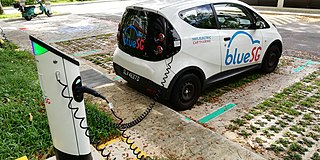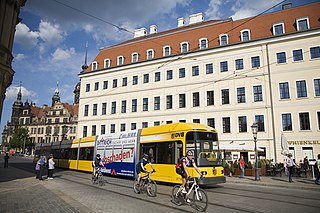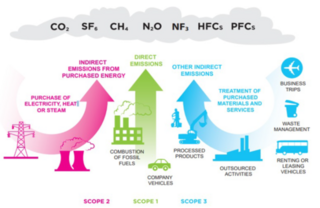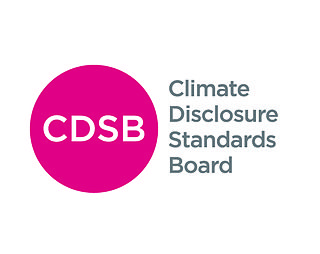Eco-capitalism, also known as environmental capitalism or (sometimes) green capitalism, is the view that capital exists in nature as "natural capital" on which all wealth depends. Therefore, governments should use market-based policy-instruments to resolve environmental problems.
A green economy is an economy that aims at reducing environmental risks and ecological scarcities, and that aims for sustainable development without degrading the environment. It is closely related with ecological economics, but has a more politically applied focus. The 2011 UNEP Green Economy Report argues "that to be green, an economy must not only be efficient, but also fair. Fairness implies recognizing global and country level equity dimensions, particularly in assuring a Just Transition to an economy that is low-carbon, resource efficient, and socially inclusive."

Green building refers to both a structure and the application of processes that are environmentally responsible and resource-efficient throughout a building's life-cycle: from planning to design, construction, operation, maintenance, renovation, and demolition. This requires close cooperation of the contractor, the architects, the engineers, and the client at all project stages. The Green Building practice expands and complements the classical building design concerns of economy, utility, durability, and comfort. Green building also refers to saving resources to the maximum extent, including energy saving, land saving, water saving, material saving, etc., during the whole life cycle of the building, protecting the environment and reducing pollution, providing people with healthy, comfortable and efficient use of space, and being in harmony with nature. Buildings that live in harmony; green building technology focuses on low consumption, high efficiency, economy, environmental protection, integration and optimization.’

Environmental technology (envirotech) is the use of engineering and technological approaches to understand and address issues that affect the environment with the aim of fostering environmental improvement. It involves the application of science and technology in the process of addressing environmental challenges through environmental conservation and the mitigation of human impact to the environment.
Environmental consulting is often a form of compliance consulting, in which the consultant ensures that the client maintains an appropriate measure of compliance with environmental regulations. Sustainable consulting is a specialized field that offers guidance and solutions for businesses seeking to operate in an environmentally responsible and sustainable way. The goal of sustainable consulting is to help organizations reduce their environmental impact while maintaining profitability and social responsibility. There are many types of environmental consultants, but the two main groups are those who enter the field from the industry side, and those who enter the field from the environmentalist side.
Eco commerce is a business, investment, and technology-development model that employs market-based solutions to balancing the world’s energy needs and environmental integrity. Through the use of green trading and green finance, eco-commerce promotes the further development of "clean technologies" such as wind power, solar power, biomass, and hydropower.

Clean technology, also called cleantech or climatetech, is any process, product, or service that reduces negative environmental impacts through significant energy efficiency improvements, the sustainable use of resources, or environmental protection activities. Clean technology includes a broad range of technology related to recycling, renewable energy, information technology, green transportation, electric motors, green chemistry, lighting, grey water, and more. Environmental finance is a method by which new clean technology projects can obtain financing through the generation of carbon credits. A project that is developed with concern for climate change mitigation is also known as a carbon project.

A sustainable city, eco-city, or green city is a city designed with consideration for social, economic, environmental impact, and resilient habitat for existing populations, without compromising the ability of future generations to experience the same. The UN Sustainable Development Goal 11 defines sustainable cities as those that are dedicated to achieving green sustainability, social sustainability and economic sustainability. They are committed to doing so by enabling opportunities for all through a design focused on inclusivity as well as maintaining a sustainable economic growth. The focus will also includes minimizing required inputs of energy, water, and food, and drastically reducing waste, output of heat, air pollution – CO2, methane, and water pollution. Richard Register, a visual artist, first coined the term ecocity in his 1987 book Ecocity Berkeley: Building Cities for a Healthy Future, where he offers innovative city planning solutions that would work anywhere. Other leading figures who envisioned sustainable cities are architect Paul F Downton, who later founded the company Ecopolis Pty Ltd, as well as authors Timothy Beatley and Steffen Lehmann, who have written extensively on the subject. The field of industrial ecology is sometimes used in planning these cities.

Carbon accounting is a framework of methods to measure and track how much greenhouse gas (GHG) an organization emits. It can also be used to track projects or actions to reduce emissions in sectors such as forestry or renewable energy. Corporations, cities and other groups use these techniques to help limit climate change. Organizations will often set an emissions baseline, create targets for reducing emissions, and track progress towards them. The accounting methods enable them to do this in a more consistent and transparent manner.

Mark Diesendorf is an Australian academic and environmentalist, known for his work in sustainable development and renewable energy. He currently researches at the University of New South Wales, Australia. He was formerly professor of environmental science and founding director of the Institute for Sustainable Futures at the University of Technology, Sydney and before that a principal research scientist with CSIRO, where he was involved in early research on integrating wind power into electricity grids. His most recent books are The Path to a Sustainable Civilisation (2023) and Sustainable Energy Solutions for Climate Change (2014).
Green jobs are, according to the United Nations Environment Program, "work in agricultural, manufacturing, research and development (R&D), administrative, and service activities that contribute(s) substantially to preserving or restoring environmental quality. Specifically, but not exclusively, this includes jobs that help to protect ecosystems and biodiversity; reduce energy, materials, and water consumption through high efficiency strategies; de-carbonize the economy; and minimize or altogether avoid generation of all forms of waste and pollution." The environmental sector has the dual benefit of mitigating environmental challenges as well as helping economic growth.

Sustainability accounting originated in the 1970s and is considered a subcategory of financial accounting that focuses on the disclosure of non-financial information about a firm's performance to external stakeholders, such as capital holders, creditors, and other authorities. Sustainability accounting represents the activities that have a direct impact on society, environment, and economic performance of an organisation. Sustainability accounting in managerial accounting contrasts with financial accounting in that managerial accounting is used for internal decision making and the creation of new policies that will have an effect on the organisation's performance at economic, ecological, and social level. Sustainability accounting is often used to generate value creation within an organisation.
This page is an index of sustainability articles.

Micro-sustainability is the portion of sustainability centered around small scale environmental measures that ultimately affect the environment through a larger cumulative impact. Micro-sustainability centers on individual efforts, behavior modification, education and creating attitudinal changes, which result in an environmentally conscious individual. Micro-sustainability encourages sustainable changes through "change agents"—individuals who foster positive environmental action locally and inside their sphere of influence. Examples of micro-sustainability include recycling, power saving by turning off unused lights, programming thermostats for efficient use of energy, reducing water usage, changing commuting habits to use less fossil fuels or modifying buying habits to reduce consumption and waste. The emphasis of micro-sustainability is on an individual's actions, rather than organizational or institutional practices at the systemic level. These small local level actions have immediate community benefits if undertaken on a widespread scale and if imitated, they can have a cumulative broad impact.

100Green, operating as Green Energy (UK) Ltd, is a British independent-energy company based in Ware, Hertfordshire. It was established in 2001 by CEO Douglas Stewart. The company provides Ofgem-certified renewable electricity and green gas to a variety of customers, including homes, businesses, and organizations throughout Great Britain. It is currently the only energy supplier in the UK to offer 100% green gas.
Eco-investing or green investing is a form of socially responsible investing where investments are made in companies that support or provide environmentally friendly products and practices. These companies encourage new technologies that support the transition from carbon dependence to more sustainable alternatives. Green finance is "any structured financial activity that has been created to ensure a better environmental outcome."
Ecodesk is a cloud based data platform used by corporate businesses to track, monitor and report their ESG data.

The Sustainability Accounting Standards Board (SASB) is a non-profit organization, founded in 2011 by Jean Rogers to develop sustainability accounting standards. Investors, lenders, insurance underwriters, and other providers of financial capital are increasingly attuned to the impact of environmental, social, and governance (ESG) factors on the financial performance of companies, driving the need for standardized reporting of ESG data. Just as the International Accounting Standards Board (IASB) and the Financial Accounting Standards Board (FASB) have established International Financial Reporting Standards and Generally Accepted Accounting Principles (GAAP), respectively, which are currently used in the financial statements, SASB's stated mission “is to establish industry-specific disclosure standards across ESG topics that facilitate communication between companies and investors about financially material, decision-useful information. Such information should be relevant, reliable and comparable across companies on a global basis.”

The Climate Disclosure Standards Board (CDSB) is a non-profit organization working to provide material information for investors and financial markets through the integration of climate change-related information into mainstream financial reporting. CDSB operates on the premise that investors and financial institutions can make better and informed decisions if companies are open, transparent and analyse the risks and opportunities associated with climate change-related information. To this end, CDSB acts as a forum for collaboration on how existing standards and practices can be used to link financial and climate change-related information using its Framework for reporting environmental information, natural capital and associated business impacts.
Sustainable finance is the set of practices, standards, norms, regulations and products that pursue financial returns alongside environmental and/or social objectives. It is sometimes used interchangeably with Environmental, Social & Governance (ESG) investing. However, many distinguish between ESG integration for better risk-adjusted returns and a broader field of sustainable finance that also includes impact investing, social finance and ethical investing.










